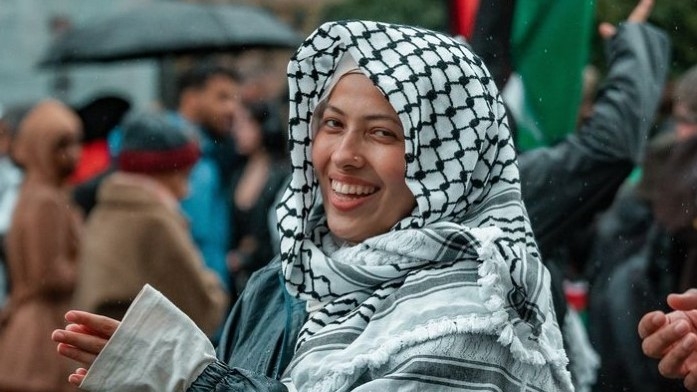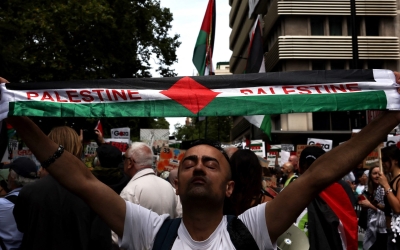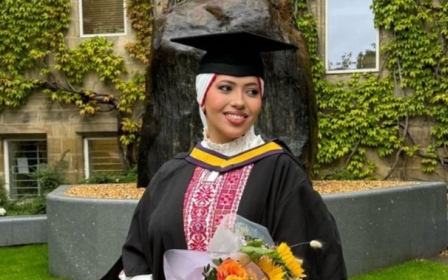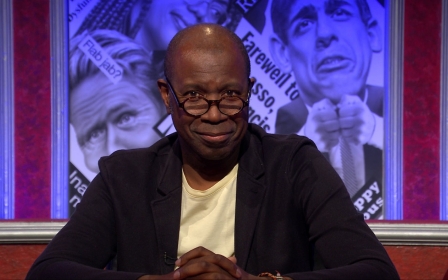Palestinian student who won UK visa appeal says laws are being abused

A law student who succcessfully appealed the British government's decision to cancel her study visa after she spoke at a pro-Palestine rally says that counter-terrorism powers are being abused to silence activists in the UK.
In her first interview since winning her appeal in Manchester last month, Dana Abuqamar told Middle East Eye: "My life is finally back on track."
Describing the moment when she learnt that an immigration tribunal had ruled in her favour, the 20-year-old, who headed the Manchester Friends of Palestine Society (FOP) at the University of Manchester, added: “I started crying when I found out. It was finally over - a year of intense stress, false accusations, and feeling like my life was crumbling before me.”
Abuqamar's legal ordeal came after she spoke at a pro-Palestine demonstration in Manchester on 8 October, one day after the Hamas-led attacks in southern Israel.
The demonstration was called amid expectations that Israel would launch an imminent attack against Gaza in response.
New MEE newsletter: Jerusalem Dispatch
Sign up to get the latest insights and analysis on Israel-Palestine, alongside Turkey Unpacked and other MEE newsletters
She gained attention online after she made statements over Gaza's historical resistance to Israel's "oppressive regime" and a subsequent interview with Sky News where she said: "For 16 years Gaza has been under blockade, and for the first time they are actively resisting, they are not on the defence, and this is truly a once-in-a-lifetime experience.”
Days later, the British government wrote to Abuqamar to inform her that it had revoked her student visa on the grounds of "national security", claiming she was a risk to public safety.
But in its final judgment, the immigration tribunal ruled that the Home Office had failed to demonstrate how Abuqamar's presence in the UK was "not conducive to the public good".
Abuse of power
The judgement found the government's "own assessment supports the proposition that...[Abuqamar] was not expressing support for Hamas, nor for the actions they carried out in the 7 October attacks.
"The reference to those Gazans living in ‘fear’ is unlikely to be objectively interpreted as a reference to Hamas fighters."
While she was eventually vindicated, Abuqamar believes her struggle to stay in the UK and continue her studies exposes what she describes as systemic censorship and abuse of power.

"I never expected it to reach this point," she said, reflecting on her challenges over the past year.
As a Palestinian studying law in the UK, Abuqamar had long believed that advocating for human rights would be protected under British law and aspired to work for international institutions like the United Nations.
"It’s one thing to read about cases like this in textbooks, but it’s entirely different to experience systemic discrimination yourself, seeing your life and future hanging by a thread."
For Abuqamar, the political nature of her case became clear early on.
Disclosures during the legal process revealed that then UK Immigration Minister Robert Jenrick had taken a personal interest in her case.
Court papers revealed that Jenrick had instructed his secretary to email the Home Office to assess the possibility of revoking Abuqamar's student visa.
The Home Office then referred Abuqamar's case to its Special Cases Unit, which in turn approached three more Home Office units: the National Community Tensions Team (NCTT); the Research, Information and Communications Unit (RICU); and Homeland Security Analysis Insight (HSAI).
RICU said Abuqamar posed no threat, but the NCTT and HSAI claimed she supported Hamas because the Manchester Friends of Palestine group had a "relationship with Friends of Al Aqsa", a pro-Palestine campaign group.
Abuqamar denied these claims, with Judge Melanie Plimmer, in her final judgment, emphasising that she "is not an extremist".
'It was shocking to see how ministers use immigration and counter-terror powers to pursue personal and political goals'
- Dana Abuqamar
Plimmer noted that Abuqamar's language of "actively resisting" and "broke free" would be understood by informed observers as references to lawful forms of Palestinian resistance.
"It was shocking to see how ministers use immigration and counter-terror powers to pursue personal and political goals," Abuqamar explains.
"These laws, which should protect human rights, are being abused to suppress political opinions that the government doesn’t agree with."
A spokesperson for the Home Office said it did not comment on individual cases.
The decision to revoke Abuqamar's student visa was taken by the previous Conservative government. But the Home Office continued to fight the case after Labour took office following a general election in July.
Tess Gregory, a partner with Leigh Day, who represented Abuqamar added: "The tribunal has made plain that expressions of solidarity with lawful Palestinian resistance which deeply reflect the sense of historical injustice shared by many Palestinians must not and cannot be equated with support for terrorism."
Deaths of family members
Holding Canadian and Jordanian citizenship, Abuqamar is a Palestinian who has family in the Gaza Strip. Since Israel launched its devastating bombardment of Gaza, Abuqamar has lost 15 relatives.
Abuqamar said her family and friends were relieved by the court’s decision, but had also borne the emotional weight of the ordeal.
"My parents were praying day and night for me. When I told them we had won, they were screaming with joy," she said.
'This was about standing up for all the people who are suffering under these unjust systems and calling out what’s happening to Palestinians'
- Dana Abuqamar
"But it wasn’t just them; friends, fellow activists, and even strangers in the UK Palestinian community reached out constantly. It was like we were all going through this together."
After being told that her student visa was to be revoked in December, Abuqamar also had to fight to continue her studies after the university cancelled her enrollment.
While this was subsequently overturned she found herself locked our of the university for three weeks during exam season.
Still, she managed to complete assignments and submit essays, graduating with a first class degree in law.
"I wasn’t going to let them ruin my education," said Abuqamar determinedly. "Because deep down, I knew this was an unjust decision. My belief in justice pushed me to keep going."
Abuqamar also recounts the strain of balancing the fight for her rights with the pain of witnessing violence against family members in Gaza.
"This wasn’t just about me," she said. "This was about standing up for all the people who are suffering under these unjust systems and calling out what’s happening to Palestinians, both here and in Palestine."
Beyond her own case, she welcomed the court’s ruling as a broader win for the pro-Palestinian movement.
"The judge recognised that my statements were legitimate expressions of support for Palestinian rights, not a threat," she said.
"It’s a reminder that our rights to speak out are protected, even if the government tries to undermine them."
'Criminalising us'
In recent years, the UK has seen a rise in cases against activists, with new measures aiming to limit public demonstrations and expressions of dissent.
Earlier this year, a pregnant woman was acquitted after she was arrested for holding a pro-Palestinian placard that depicted former Prime Minister Rishi Sunak and then Home Secretary Suella Braverman as coconuts.
Abuqamar said these cases against pro-Palestine activists reflected a growing "war on the Palestinian movement".

"They’re trying to criminalise us," she said. "But we’re not going to stop. My ruling is proof that justice can prevail if we keep fighting."
Though vindicated, Abuqamar acknowledged the toll of the journey and the reforms still needed.
"This isn’t the end," she emphasised. "There are still others going through similar battles, and the government is still using its power to silence dissent. No one should have to go through this level of legal stress just to express their beliefs."
Tasnima Uddin, from the European Legal Support Center, which helped Abuqamar echoed the Palestinian's concern and and said her victory "is a crucial step against the erosion of civil liberties and sends a clear message: solidarity with Palestine is not a crime".
As she looks toward the future, Abuqamar feels uncertain but resolute.
"I’m figuring out my next steps, but I know I want to keep working in human rights and law," she said.
"This experience has only strengthened my commitment to the law - seeing the flaws up close, I feel even more compelled to protect human rights."
Abuqamar hopes her victory will also serve as a call to action for others.
"This ruling should give activists hope to keep advocating, to keep showing up, and to remember that while the fight is difficult, justice can still be achieved."
Middle East Eye delivers independent and unrivalled coverage and analysis of the Middle East, North Africa and beyond. To learn more about republishing this content and the associated fees, please fill out this form. More about MEE can be found here.




